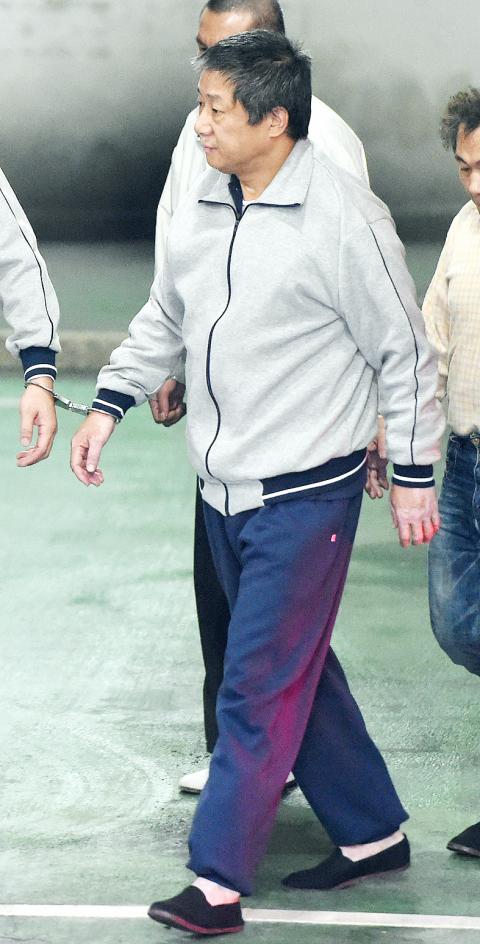Investigation bureau agents yesterday raided the homes of two — one active and one retired — air force pilots allegedly recruited by a Chinese intelligence officer in a case described as the largest Chinese spy ring to have operated in Taiwan in recent years.
A preliminary investigation showed that a retired deputy commander of the Republic of China’s Air Force Academy’s flight training section surnamed Ke (葛) had been offered free trips to Southeast Asia by Zhen Xiaojiang (鎮小江), a Chinese intelligence officer, in exchange for confidential military information, the Taipei District Prosecutors’ Office said.
The trips took place between 2009 and 2013 before Ke’s retirement.

Photo: Liao Chen-huei, Taipei Times
“During that period, Ke provided confidential air force intelligence information to other Chinese intelligence officers introduced by Zhen at places outside of Taiwan and China,” prosecutors said.
Following his retirement, Ke persuaded his former colleague, a lieutenant colonel surnamed Lou (樓) who is the deputy director of the flight training section, to join the spy network set up by Zhen in Taiwan, they said.
Ke and Lou were brought in for questioning yesterday on suspicion of violating the National Security Act (國家安全法). Three witnesses were also present.
Zhen, a former People’s Liberation Army officer, was arrested in Taiwan in September last year.
He is accused of offering several retired Taiwanese military officers trips to Vietnam, Thailand, South Korea and Japan.
He also allegedly arranged many dinner meetings between the military officers and Chinese intelligence personnel outside of Taiwan, during which the latter obtained information on the Mirage 2000 aircraft, the ultra-high-frequency radar installation on Leshan (樂山) in Hsinchu County and on Taiwan’s advanced military technology and newly procured weaponry.
Zhen was indicted in January, along with five Taiwanese military officers — including former army major general Hsu Nai-chuan (許乃權), air force colonel Chou Chih-li (周自立), air force pilot Sung Chia-lu (宋嘉祿) and air force official Yang Jung-hua (楊榮華), — and Lee Huan-yu (李寰宇), a Kaohsiung nightclub operator.
The case is being tried at the Taipei District Court.
Prosecutors said Zhen is the first Chinese spy to be arrested in Taiwan in recent years, adding that his espionage ring is believed to include more than 10 Taiwanese military officers.
Ministry of National Defense spokesman Major General David Lo (羅紹和) told an impromptu press conference yesterday that the ministry would fully cooperate with prosecutors in the investigation.
He refused to comment on the probe, citing confidentiality.
“Given that the case revolving around Zhen originated from a tipoff received by the ministry’s public security division, it indicates the effectiveness of the army’s national security endeavors,” Lo said, adding that the ministry would step up its efforts to instill patriotism in soldiers.

The Central Election Commission has amended election and recall regulations to require elected office candidates to provide proof that they have no Chinese citizenship, a Cabinet report said. The commission on Oct. 29 last year revised the Measures for the Permission of Family-based Residence, Long-term Residence and Settlement of People from the Mainland Area in the Taiwan Area (大陸地區人民在台灣地區依親居留長期居留或定居許可辦法), the Executive Yuan said in a report it submitted to the legislature for review. The revision requires Chinese citizens applying for permanent residency to submit notarial documents showing that they have lost their Chinese household record and have renounced — or have never

A magnitude 5.6 earthquake struck off the coast of Yilan County at 12:37pm today, with clear shaking felt across much of northern Taiwan. There were no immediate reports of damage. The epicenter of the quake was 16.9km east-southeast of Yilan County Hall offshore at a depth of 66.8km, Central Weather Administration (CWA) data showed. The maximum intensity registered at a 4 in Yilan County’s Nanao Township (南澳) on Taiwan’s seven-tier scale. Other parts of Yilan, as well as certain areas of Hualien County, Taipei, New Taipei City, Taoyuan, Hsinchu County, Taichung and Miaoli County, recorded intensities of 3. Residents of Yilan County and Taipei received

Taiwan has secured another breakthrough in fruit exports, with jujubes, dragon fruit and lychees approved for shipment to the EU, the Ministry of Agriculture said yesterday. The Animal and Plant Health Inspection Agency on Thursday received formal notification of the approval from the EU, the ministry said, adding that the decision was expected to expand Taiwanese fruit producers’ access to high-end European markets. Taiwan exported 126 tonnes of lychees last year, valued at US$1.48 million, with Japan accounting for 102 tonnes. Other export destinations included New Zealand, Hong Kong, the US and Australia, ministry data showed. Jujube exports totaled 103 tonnes, valued at

BIG SPENDERS: Foreign investors bought the most Taiwan equities since 2005, signaling confidence that an AI boom would continue to benefit chipmakers Taiwan Semiconductor Manufacturing Co’s (TSMC, 台積電) market capitalization swelled to US$2 trillion for the first time following a 4.25 percent rally in its American depositary receipts (ADR) overnight, putting the world’s biggest contract chipmaker sixth on the list of the world’s biggest companies by market capitalization, just behind Amazon.com Inc. The site CompaniesMarketcap.com ranked TSMC ahead of Saudi Aramco and Meta Platforms Inc. The Taiwanese company’s ADRs on Tuesday surged to US$385.75 on the New York Stock Exchange, as strong demand for artificial intelligence (AI) applications led to chip supply constraints and boost revenue growth to record-breaking levels. Each TSMC ADR represents